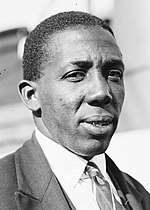Learie Constantine, Date of Birth, Place of Birth, Date of Death
TweetLearie Constantine
West Indian cricketer, lawyer, politician and diplomat
 Date of Birth: 21-Sep-1901
Date of Birth: 21-Sep-1901
 Place of Birth: Diego Martin, Diego Martin Regional Corporation, Trinidad and Tobago
Place of Birth: Diego Martin, Diego Martin Regional Corporation, Trinidad and Tobago
Date of Death: 01-Jul-1971
Profession: lawyer, politician, diplomat, cricketer
Nationality: United Kingdom, Barbados, Trinidad and Tobago
Zodiac Sign: Virgo 
About Learie Constantine
- Learie Nicholas Constantine, Baron Constantine, (21 September 1901 – 1 July 1971) was a West Indian cricketer, lawyer and politician who served as Trinidad's High Commissioner to the United Kingdom and became the UK's first black peer.
- He played 18 Test matches before the Second World War and took the West Indies' first wicket in Test cricket.
- An advocate against racial discrimination, in later life he was influential in the passing of the 1965 Race Relations Act in Britain.
- He was knighted in 1962 and made a life peer in 1969. Born in Trinidad, Constantine established an early reputation as a promising cricketer, and was a member of the West Indies teams that toured England in 1923 and 1928.
- Unhappy at the lack of opportunities for black people in Trinidad, he decided to pursue a career as a professional cricketer in England, and during the 1928 tour was awarded a contract with the Lancashire League club Nelson.
- He played for the club with distinction between 1929 and 1938, while continuing as a member of the West Indies Test team in tours of England and Australia.
- Although his record as a Test cricketer was less impressive than in other cricket, he helped to establish a uniquely West Indian style of play.
- He was chosen as one of the Wisden Cricketers of the Year in 1939. During the Second World War, Constantine worked for the Ministry of Labour and National Service as a Welfare Officer responsible for West Indians employed in English factories.
- In 1943, the manager of a London hotel refused to accommodate Constantine and his family on the grounds of their race; Constantine successfully sued the hotel company.
- Commentators recognise the case as a milestone in British racial equality.
- Constantine qualified as a barrister in 1954, while also establishing himself as a journalist and broadcaster.
- He returned to Trinidad in 1954, entered politics and became a founding member of the People's National Movement, subsequently entering the Trinidad government as minister of communications.
- From 1961 to 1964, he served as Trinidad's High Commissioner to the United Kingdom and, controversially, became involved in issues relating to racial discrimination, including the Bristol Bus Boycott.
- In his final years, he served on the Race Relations Board, the Sports Council and the Board of Governors of the BBC.
- Failing health reduced his effectiveness in some of these roles, and he faced criticism for becoming a part of the British Establishment.
- He died of a heart attack on 1 July 1971, aged 69.
Read more at Wikipedia
See Also
- Famous People's Birthdays on 21 September, Trinidad and Tobago
- Famous People's Birthdays in September, Trinidad and Tobago
- Famous People's Birthdays on 21 September, United Kingdom
- Famous People's Birthdays in September, United Kingdom
- Famous People's Birthdays on 21 September, Barbados
- Famous People's Birthdays in September, Barbados
- Famous lawyer's Birthdays on 21 September, Trinidad and Tobago
- Famous lawyer's Birthdays in September, Trinidad and Tobago
- Famous politician's Birthdays on 21 September, Trinidad and Tobago
- Famous politician's Birthdays in September, Trinidad and Tobago
- Famous diplomat's Birthdays on 21 September, Trinidad and Tobago
- Famous diplomat's Birthdays in September, Trinidad and Tobago
- Famous cricketer's Birthdays on 21 September, Trinidad and Tobago
- Famous cricketer's Birthdays in September, Trinidad and Tobago
- Famous lawyer's Birthdays on 21 September, United Kingdom
- Famous lawyer's Birthdays in September, United Kingdom
- Famous politician's Birthdays on 21 September, United Kingdom
- Famous politician's Birthdays in September, United Kingdom

